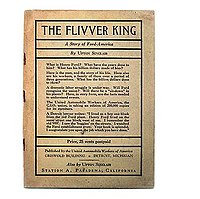The Flivver King

Cover of the 1st edition, 1st printing, Published by the UAW, Detroit, MI., 1937, "Price 25 cents postpaid"
|
|
| Author | Upton Sinclair |
|---|---|
| Country | United States |
| Language | English |
| Genre | historical fiction |
| Publisher | United Automobile Workers (1937), Charles H. Kerr (1984) |
|
Publication date
|
1937, 1984 |
| Media type | |
| Pages | 119 |
| ISBN | (Charles H. Kerr edition, 1984) |
| OCLC | 21023048 |
The Flivver King: A Story of Ford-America is a novel by Upton Sinclair, published in 1937, that tells the intertwined stories of Henry Ford and a fictional Ford worker Abner Shutt.
On Bagley Street in the city of Detroit, Little Abner Shutt begins the story by explaining to his mother that "there's a feller down the street says he's goin' to make a wagon that'll run without a horse." The man is Henry Ford. The story follows the progress and growth of Ford Motor Company through the perspective of a number of generations of a single family.
"The Flivver King" demonstrates the effects of Scientific Management in factories. The Ford factory began with very skilled workers. Through a process of breaking the skilled job down into simple steps, they were able to hire lower wage, less skilled individuals to do the work. The Flivver King explains how the Ford Company used scientific management to replace skilled workers while successfully increasing production.
The first edition, published by the UAW states on the cover, that it was printed "in an edition of 200,000 copies for its members". There is no mistake that the book was meant to provoke and challenge its readers; on the cover (seen here), as a preface to the first edition it is stated:
What is Henry Ford? What have the years done to him? What has his billion dollars made of him?
Here is the man, and the story of his life. Here also are his workers, a family of them over a period of three generations. What has the billion dollars done to them?
A dramatic labor struggle is under way. Will Ford recognize the union? Will there be a "sit-down" in his plants? Here, in story form, are the facts needed to understand events.
...
Wikipedia
